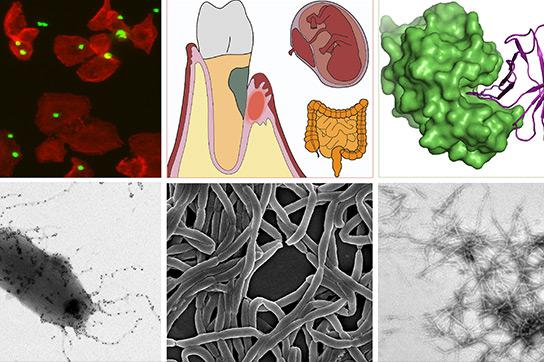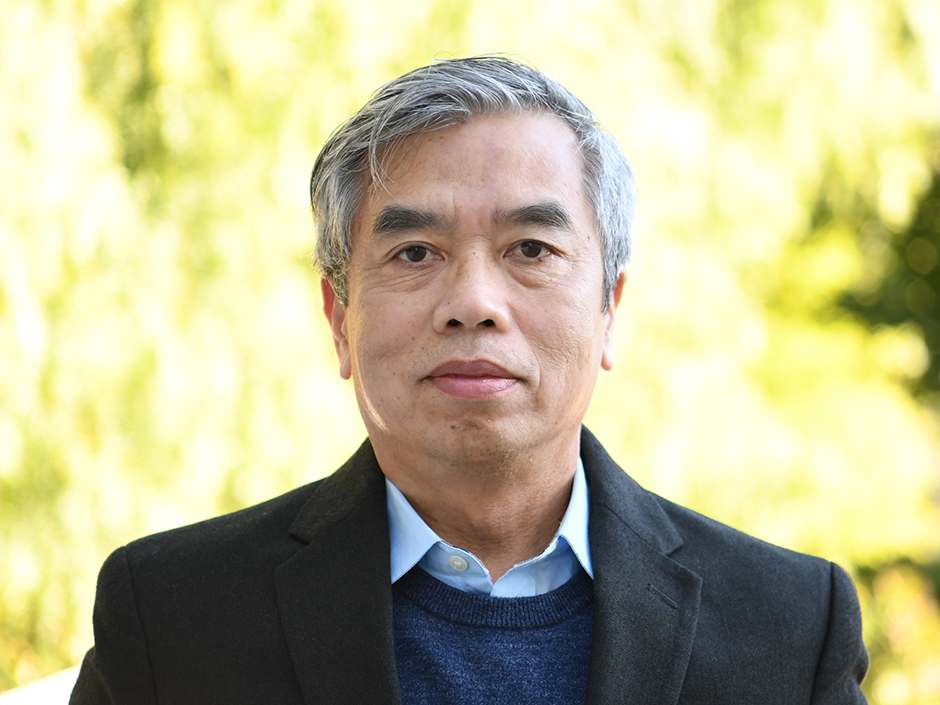Ton-That Lab


Principal Investigator:
Hung Ton-That, Ph.D.About
Gram-positive and Gram-negative bacterial pathogens employ a wide range of pathogenic strategies to not only thrive in diverse environments but also cause disease. Surface covalently-linked protein polymers known as pili or fimbriae are an example of virulence factors produced by Gram-positive bacteria that enable them to adhere to specific host tissues and initiate a pathogenic program. The laboratory uses the oral colonizers Actinomyces oris and Corynebacterium diphtheriae as experimental models to investigate the mode of pilus assembly and the role of pili in biofilm formation and bacterial pathogenesis. For instance, the lab has recently discovered a mechanism of how C. diphtheriae produces pilus polymers and how A. oris modulates spatial positioning of adhesive pili for cell-to-cell interactions. The lab also discovered that both C. diphtheriae and A. oris employ a thiol-disulfide oxidoreductase – an enzyme similar to protein disulfide isomerase found in mammalian cells – to maintain proper folding of pili and many exported factors. Serendipitously, the studies of surface assembly disclose a facile and versatile platform for protein engineering and bio-conjugation, as well as a high throughput screen for small molecules as anti-virulence strategies to target bacterial infections. While Gram-negative pathogens, like the oral colonizer Fusobacterium nucleatum, do not assemble covalently-linked pili, they produce surface organelles and exofactors that can manipulate the host immune response and cause tissue damage. Current efforts are being made in the lab to reveal virulence determinants and pathogenic strategies that allow F. nucleatum to flourish in the adverse environment of oral biofilms and to spread to extra-oral sites, such as placenta and colorectal tissue, leading to induction of preterm birth and promotion of colon cancer.
Current Projects and Grants
- Molecular assembly on the cell surface of Gram-positive bacteria (R01 DE017382/NIDCR – PI)
- Post-translocational protein folding in Gram-positive bacteria (R01 DE025015/NIDCR – PI)
- Virulence determinants of Fusobacterium nucleatum (R01 DE026758/NIDCR – PI)
Publications
- Chang C, Wu C, Osipiuk J, Siegel SD, Zhu S, Liu X, Joachimiak A, Clubb RT, Das A, and Ton-That H (2019). Cell-to-cell interaction requires optimal positioning of a pilus tip adhesin modulated by Gram-positive transpeptidase enzymes. Proc Natl Acad Sci
- Siegel SD*, Amer BR*, Wu C, Sawaya MR, Gosschalk JE, Clubb RT†, and Ton-That H† (2019). Structure and mechanism of LcpA, a phosphotransferase that mediates glycosylation of a Gram-positive cell wall anchored protein. mBio, 10:e01580-18.
- Chang C*, Amer BR*, Osipiuk J, McConnell SA, Huang IH, Hsieh V, Fu J, Nguyen HH, Muroski J, Flores E, Loo R, Loo J, Putkey JA, Joachimiak A, Das A, Clubb RT†, and Ton-That H† (2018). In vitro reconstitution of sortase-catalyzed pilus polymerization rev
- Wu C, Al Mamun AA, Luong TT, Hu B, Gu J, Lee JH, D’Amore M, Das A, and Ton-That H (2018). Forward Genetic Dissection of Biofilm Development by Fusobacterium nucleatum: Novel Functions of Cell Division Proteins FtsX and EnvC. mBio, 9(2):e00360-18.
- Sanchez B, Chang C, Wu C, Tran B, and Ton-That H (2017). Electron transport chain is biochemically linked to pilus assembly required for polymicrobial interactions and biofilm formation in the Gram-positive actinobacterium Actinomyces oris. mBio, 8(3):
- Cell-to-cell Interaction Requires Optimal Positioning of a Pilus Pip Adhesin Mo…
- Structure and Mechanism of LcpA, a Phosphotransferase That Mediates Glycosylati…
- In Vitro Reconstitution of Sortase-catalyzed Pilus Polymerization Reveals Struc…
- Forward Genetic Dissection of Biofilm Development by Fusobacterium nucleatum: N…
- Electron Transport Chain Is Biochemically Linked to Pilus Assembly Required for…
- Full publications in PubMed
Lab Members
-

-
 C. Julie Chang
C. Julie Chang
jchang@dentistry.ucla.edu- Adjunct Assistant Professor
Office: 33-030 CHS
Phone: (310) 267-3340
Collaborators
List of collaborators within and outside of UCLA:
- Robert Clubb, PhD (UCLA)
- Nee-Ho Park, DMD, PhD (UCLA)
- Kym Faull, PhD (UCLA)
- Asis Das, PhD (UConn Health Center)
- Jerzy Osipiuk, PhD (Argonne National Laboratory)
- Andreas Tauch, PhD (Bielefeld University, Germany)
List of Lab Members:
- Chungyu (Julie) Chang, PhD; Adjunct Assistant Professor
- Minh Tan Nguyen, PhD; Postdoc
- Aadil H. Bhat, PhD; Postdoc
- Yi-Wei Chen, PhD; Postdoc
- Matthew Scheible; Graduate Student
- Nicholas Ramirez; Graduate Student
- Joonhee Kim; DDS/PhD Student
- Yimin Chen; Lab Assistant
- Emily Peluso; Lab Assistant
- Alexander Lin; Undergraduate
- Kevin To; Undergraduate
Opportunities
Graduate Student Researcher (GSR) positions are available in the Ton-That Lab to investigate the molecular mechanisms of bacterial pathogenicity. Thesis projects will be centered on the three major projects in the lab, which include “Virulence determinants of Fusobacterium nucleatum”, “Molecular assembly on the cell surface of Gram-positive bacteria”, and “Post-translocational protein folding in Gram-positive bacteria”. The laboratory employs a multidisciplinary approach that combines genetics, molecular biology, electron microscopy, X-ray crystallography, biophysics, mass spectrometry, and various biochemical methods, as well as cell-based assays and rodent models of infection. Therefore, graduate students will have ample opportunities to be broadly trained. Please contact Dr. Ton-That for further details, if interested.
We continue to recruit highly motivated postdoctoral fellows (PhD, DDS or MD), with strong records of publications and excellent written and oral communication skills, to work with our multidisciplinary research team. Interested candidates should send a detailed CV, a statement of research interests, and the contact information of three referees to Dr. Ton-That.
We also provide opportunities for inspired undergraduates to participate in research projects, while learning techniques in molecular biology, biochemistry, and genetics. Interested students should send a detailed CV to Dr. Ton-That.
Contact Us
(310) 267-5910
htonthat@dentistry.ucla.edu
